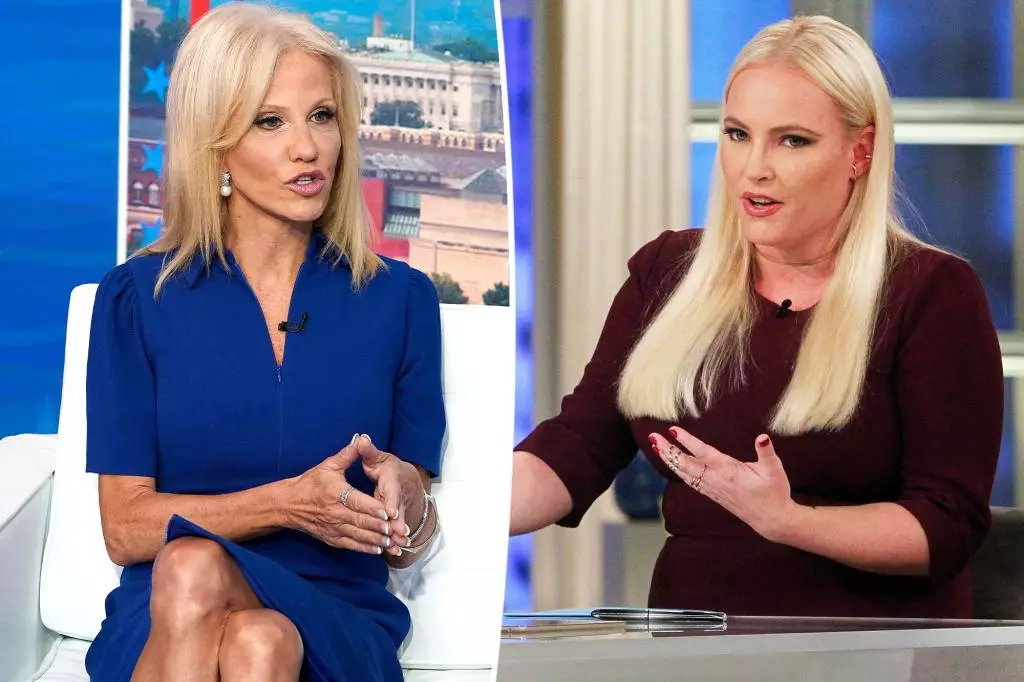The world of political commentary is often filled with tensions and confrontations, but a recent encounter between Kellyanne Conway and Meghan McCain at a Women’s Summit hosted by Tina Brown has stood out for its dramatic nature. The back-and-forth between these two prominent figures not only highlights the complexities of political discourse but also emphasizes how personal narratives intertwine with public personas. The events in question showcase the volatile mix of emotions that come to the surface when political ideologies clash, extending beyond mere policy discussions to deeply personal issues.
The incident unfolded backstage after Conway, McCain, and DNC Convention host Minyon Moore completed a panel discussion. It was here, amid the chaotic buzz of a behind-the-scenes atmosphere, that emotions reportedly escalated. While the exact details remain contested, witnesses describe a confrontation between Conway, the former Senior Counselor to President Trump, and McCain, known for her vocal critiques of the current political landscape. This scenario serves as a powerful reminder of how professional and personal lives often intersect for public figures, leading to moments that might otherwise be contained within the privacy of their personal lives.
For anyone present, the encounter took an unexpected turn. Conway allegedly approached McCain, expressing deep personal feelings about comments McCain made regarding her marriage to George Conway. The incident ignited when McCain labeled Conway’s relationship as “gross,” sparking outrage from Conway, who felt her personal life was being unjustly scrutinized. Though some observers describe Conway as calm and composed, others portray her as emotionally charged, yelling at McCain.
In the aftermath of the confrontation, eyewitness accounts diverged starkly. While some claimed Conway “calmly” asserted her rights to protect her marriage from public ridicule, others reported an emotionally charged tirade whereby her voice echoed in the confines of the green room. McCain’s response was equally poignant—asserting her discomfort and attempting to deflect the intensity of the charges aimed at her. This contrasting portrayal illuminates the complexities of communication in high-stakes scenarios, where emotions can distort perceptions and lead to vastly different interpretations of the same event.
Meanwhile, the historical context of their exchange serves as a backdrop for understanding the emotional weight carried by both women. McCain’s reference to Donald Trump’s disparaging remarks about her decorated father, the late Senator John McCain, underscores the gravity of personal trauma that shadows her experience in the political arena. This not only framed her narrative but also illustrated how deeply the political landscape has affected her life. In response, Conway’s insistence that she was not Trump brings forth another layer of complexity, showcasing her desire to dissociate from the larger-than-life figure associated with contentious rhetoric.
The incident between Conway and McCain raises important discussions on how personal grievances should be addressed within the sphere of public life. At what point do personal and professional boundaries blur, especially for figures who are regularly in the public eye? The green room confrontation illustrates the often-ignored emotional toll that political discourse can create—not just for those in power, but for their families as well.
As the dust settles, it becomes clear that public events have the potential to serve as platforms for personal expressions of anger and hurt, necessitating a more profound understanding of the shared humanity among political figures. Conway’s characterization of the exchange as professional stands in stark contrast to the reports of a highly charged atmosphere, further complicating the narrative.
In the end, the confrontation between Kellyanne Conway and Meghan McCain serves as a microcosm of broader political tensions, blending personal emotions with public personas. The varying accounts reflect not just differing perspectives but also highlight the often-overwhelming weight individuals in the spotlight must carry. The fallout from such incidents underscores the importance of approaching political discourse with sensitivity and awareness, recognizing the human experiences that lie behind ideological battles.
The clash in the green room may have offered a brief but illuminating glimpse into the complex framework of modern political interactions—one that holds potential lessons for all involved, particularly the need for civility amidst passionate debate.
